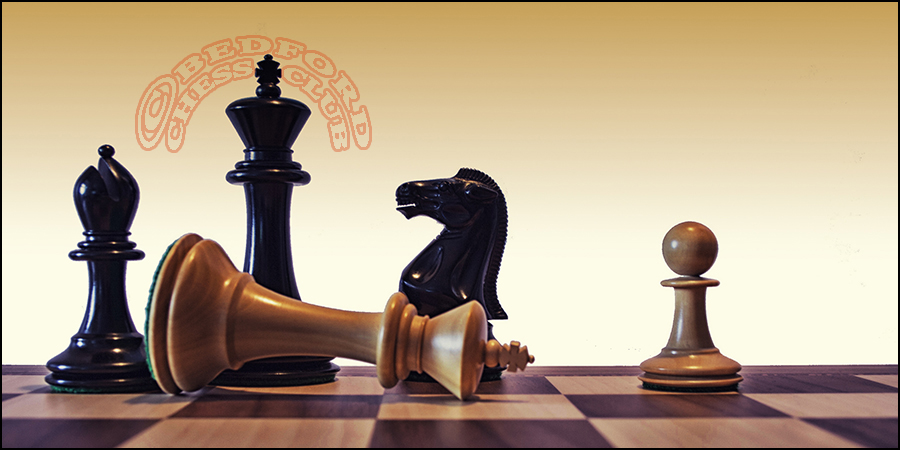One of our own!
Probably Bedford’s strongest ever player (?) Andy Ledger, produced this on the 4ncl final weekend.
Sandy Cordon v Nigel Staddon
Nigel Staddon provides this game (notes by Paul Habershon), the oldest Sandy Cordon game retrieved so far. Sandy achieves a crushing position but fails to capitalise. We are still hoping to uncover one of the many games he must have won!
Sandy Cordon v Paul Habershon
Searching for my games v. Sandy Cordon I was surprised by two things: a) I had hoped to see one of his wins but my record is W2 D3 L0, despite our grades being similar; b) all five games were in team matches in the Beds. League, suggesting that Sandy did not compete in the Club Individual Championship. He was probably more interested in helping other players. However, here is our last encounter, an exciting draw which he certainly should have won. As Black in almost any opening Sandy was a great believer in fianchettoing his King’s Bishop. Incidentally if you are wondering why Sandy was playing for Bedford B, in those days Bedford split their strength between A and B teams.
The engine still gives Black +0.38. Either the draw was agreed now or it went for that curious throwback: adjudication. Believe it or not, some leagues still retain it! I can’t believe this was my last game against Sandy (1975). Jim Plaskett recalls him playing a stunning queen sacrifice at the Hitchin Congress in 1983. It would be good if there’s a record of that somewhere.
Super-Grandmaster Slaying!
It’s light relief, but the little guy spectacularly flattening the guy who should have been World Champion is worth including, especially if the little guy is from Bedfordshire…
This game is included as a tribute to the little guys. It appeared in B H Wood’s column in the Daily Telegraph, and was excavated by Mark McCready in his excellent chess blog. You might suppose from some of the games in this collection, such as Penrose-Tal and Speelman-Short, that mastery of the opening was the most important thing in the game. This game shows that even having helped to write the “book” doesn’t necessarily guarantee safety from upsets. After playing at Hastings in 1976, Viktor Korchnoi, one of the finest players never to become World Champion, gave a simultaneous display over 32 boards at Luton. He won 30 of the games and drew another. But in the remaining game…
Two junior gems
We are grateful to Joe’s mum for not throwing away the following two games played by Joe’s brother Angelo against the Ledger brothers. Both are short and sweet, but not without interest and show a taste of the future successes that they both enjoyed.
In the first, Angelo exploits Andrew’s reluctance to castle in a timely manner.
.. but the second shows David retrieving the family honour.
Paul’s postal triumph
Early in 2015, the Club received a donation of some books belonging to a keen correspondence player who had recently died. And lurking in a back number of “Correspondence Chess” for 1976/77, was this gem of a game, which won the Best Game Prize in the British Correspondence Championship 1974/75. Paul Habershon has been too modest to put it on the Club website. This omission should be remedied! The notes are by R G Thimann in “Correspondence Chess”.
Phil Roe was one of the strongest players in the Bedford club in the early 70s. This was his finest game, which won the best game prize at the Luton Open in 1973. The characteristically sardonic notes were Phil’s own for CHESS.
In September 2013, the town of Bedford played host to an impressive chess congress. The top section was won by FIDE Master David Eggleston of Durham ahead of four Grandmasters, a fine performance. This is the crucial third-round encounter between Eggleston (White) and GM Peter Wells.
Bedford has consistently punched above its weight in the National Club Championship. None of the games survive from Bedford’s finest hour when Bedford won the competition, so this game will have to serve as an example.
Drafted in as a last minute reserve, I (Neil Hickman) found myself facing a player graded about 40 points above me (and who I later learned had been Champion of Wales twice in the 1960s).
International Master Andrew Ledger has represented Bedford throughout the years. Some examples of his games (Andrew kindly annotates the first two himself):-
Yuri Averbakh wrote a good book on chess tactics in which he argued that the essence of the subject was the search for a double attack. This game, in which Andrew Ledger disposes of a strong Russian GM, offers an excellent illustration – Neil annotates.
